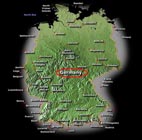Jewish teacher recounts harrowing escape from Nazis
 Berlin - A short, stocky and alert man, Erwin Goldberg sits in a first-floor room opposite Berlin's imposing Pergamon Museum, relating how a dramatic series of events swept him from Berlin to Italy and then to Argentina 70 years ago.
Berlin - A short, stocky and alert man, Erwin Goldberg sits in a first-floor room opposite Berlin's imposing Pergamon Museum, relating how a dramatic series of events swept him from Berlin to Italy and then to Argentina 70 years ago.
"I'm amazed I've survived this long. In the summer of 1938 I was given just 24 hours notice to leave the German capital by the Nazis," says Goldberg, now 95.
A letter from the office of the Berlin police president had been sent him, warning that if he failed to leave Germany the next day he would be arrested. Goldberg, then 24, was aghast.
The panic-stricken second son of a Jewish couple raced to the nearby Jewish Emigration Authority, seeking help. The building was crowded with other Jews desperately trying to leave.
Only later did it emerge that a Nazi order to round up Jews was not due to go into force until two months later. Two police officials had made an error in sending the letter to him.
But for Goldberg, it made no difference. He was told he would still have to get out of Germany within 24 hours.
Lacking proper travel documents - the Nazis had stopped issuing passports to Jews - he was saved when the Jewish resistance provided him with a Polish pass valid for six months, enabling him to travel by train via Switzerland to Milan.
Goldberg, who would later became a teacher, was never to see his parents or his younger brother again. All would perish in the Holocaust.
Even in Italy, the young man was still in danger. Mussolini had begun whipping up anti-Semitic hatred, causing some Jews to be rounded up, beaten and driven from their homes.
Recalling the events of that period, Goldberg says: "I think I must have had a guardian angel. In Berlin I'd been told a Jewish relief organization in Milan would help me and that somebody would show up to meet me on arrival. But nobody did."
However, he survived thanks to the kindness of a well-known local architect, Aldo Cantoni, his wife and son. Details about Goldberg's dramatic 1938 exploits in Italy are contained in his compelling, recently published 220-page book, Storms of Fate.
Ultimately, late in September 1938, Goldberg left Italy by ship for Buenos Aires after the Cantonis generously paid for his passage.
Goldberg says Argentina was "to be the start of an extraordinary new life for me. I became a teacher and director of schools in the jungle regions of Misiones, a beautiful province about 1,280 kilometres north of Beunos Aires, for 13 years."
Later he was offered Argentine citizenship, which he accepted, before moving to Buenos Aires where he combined being a cantor at a Jewish community synagogue with teaching posts at the city's Pestalozzi School and Goethe Institute.
Then, when he was nearing his 60th birthday, educational authorities in West Berlin, who had learned of his exploits in Argentina, offered him a the chance to return.
"I accepted a several-year teaching post at a Neukoelln school - a few months after being kindly invited to visit Berlin once again by the city's then governing mayor Klaus Schuetz.
"That visit," he says, "brought back all the happy childhood memories I'd had of Berlin and ultimately gave me the strength to return to a city that Hitler had so wickedly poisoned."
When he was close to his 65th birthday Goldberg's school contract was extended by a further three years - until finally a cancer scare forced him to retire.
Since then, Goldberg and his Argentinian-born wife, Virginia, have divided their time between Berlin and Buenos Aires. "I love Berlin's exciting cultural life, but ultimately I'm always drawn back to Argentina," he says.
Earlier this year, Klaus Wowereit, Berlin's current mayor, invited Goldberg to City Hall, claiming he was "a person the city had every reason to be proud of."
After retiring as a teacher in the late 1970s, Goldberg turned to journalism, penning articles for news outlets in both Berlin and Buenos Aires. (dpa)